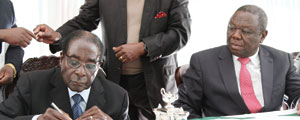
PRESIDENT Robert Mugabe yesterday signed Zimbabwe’s new constitution into law to replace the 33-year-old charter crafted in the dying days of British colonial rule.
Report by Everson Mushava
Provisions of the new charter effectively rule out the holding of elections by June 29.
Experts said the Constitution requires that a 30-day mandatory voter registration period be accommodated from the day the new constitution is published, while 56 days would be needed from the day the election date is proclaimed to the polling date.
Approved overwhelmingly in a referendum in March, the Constitution clips the powers of the President and imposes a two-term presidential limit.
However, the presidential term limit does not apply retrospectively, paving the way for the 89-year-old Mugabe to contest in fresh polls and extend his over three-decade rule by another 10 years.
Zimbabwe has been using a peace-pact constitution crafted at Lancaster House in London in 1979 to end a protracted war of liberation. The constitution was amended 19 times to entrench Mugabe and Zanu PF rule.
The parts of the new constitution which immediately took effect after the supreme law was gazetted yesterday were Chapter 3 relating to citizenship, Chapter 4 being the declaration of rights, Chapter 5 relating to the election and assumption of office of the President and Chapter 6 relating to the election of MPs, the summoning of Parliament after a general election and to the assent to Acts of Parliament by the President.
- Chamisa under fire over US$120K donation
- Mavhunga puts DeMbare into Chibuku quarterfinals
- Pension funds bet on Cabora Bassa oilfields
- Councils defy govt fire tender directive
Keep Reading
Other sections that also took immediate effect were Chapter 7 relating to elections, except sections 158, 160 and 161, Chapter 8 relating to the jurisdiction and powers of the Constitutional Court and Chapter 14 relating to provincial and local government.
Under the new charter, both genders will now be equally represented in all institutions and women will constitute at least half of the membership of all commissions.
In terms of the new Bill of Rights, the Constitution now explicitly guarantees freedom of expression and freedom of the media.
The Registrar-General and his officials will be obliged to apply the new provisions when dealing with applications for IDs, voter registration and passports. There should be a marked reduction in difficulties with officialdom.
On elections, the President will not be able to issue a proclamation calling the next elections immediately. He will have to wait for the Electoral Amendment Bill to be passed and gazetted into law.
Addressing journalists after the signing ceremony at State House, Justice minister Patrick Chinamasa confirmed some provisions of the new law would come into force immediately.
Mugabe said the adoption of the constitution was historic as it was “produced by Zimbabwe for Zimbabweans”.
“For me, this event is a happening of joy, of great joy indeed,” Mugabe said. “This is an event by Zimbabweans for Zimbabweans. In practice, in the past years, we did not have economic power, but the political power which we are now using to realise the meaning and significance of real sovereignty.”
MDC-T leader Prime Minister Morgan Tsvangirai described the event as historic. He applauded the nation for coming up with a new constitution without the help of foreigners, despite the polarisation that characterised local politics.
“As Zimbabwe, we are setting on a new journey with a new governance system,” Tsvangirai said.
Constitutional Affairs minister Eric Matinenga said the new governance charter would create an “architecture for the future of Zimbabwe”.
Deputy Prime Minister Arthur Mutambara said a document alone without upholding a culture of constitutionalism would amount to nothing.
He said the same discourse that characterised the constitution-making process should now shift to building the economy as the “stomach was more important that the constitution”.











